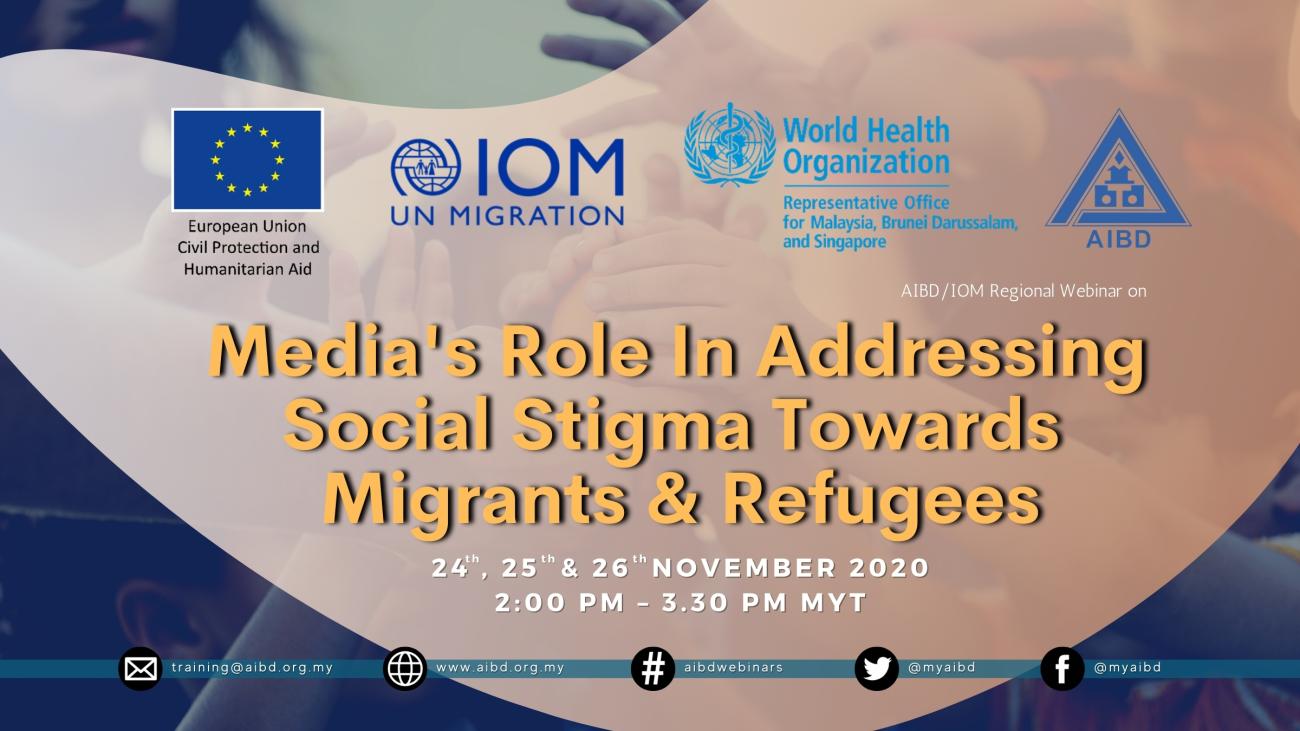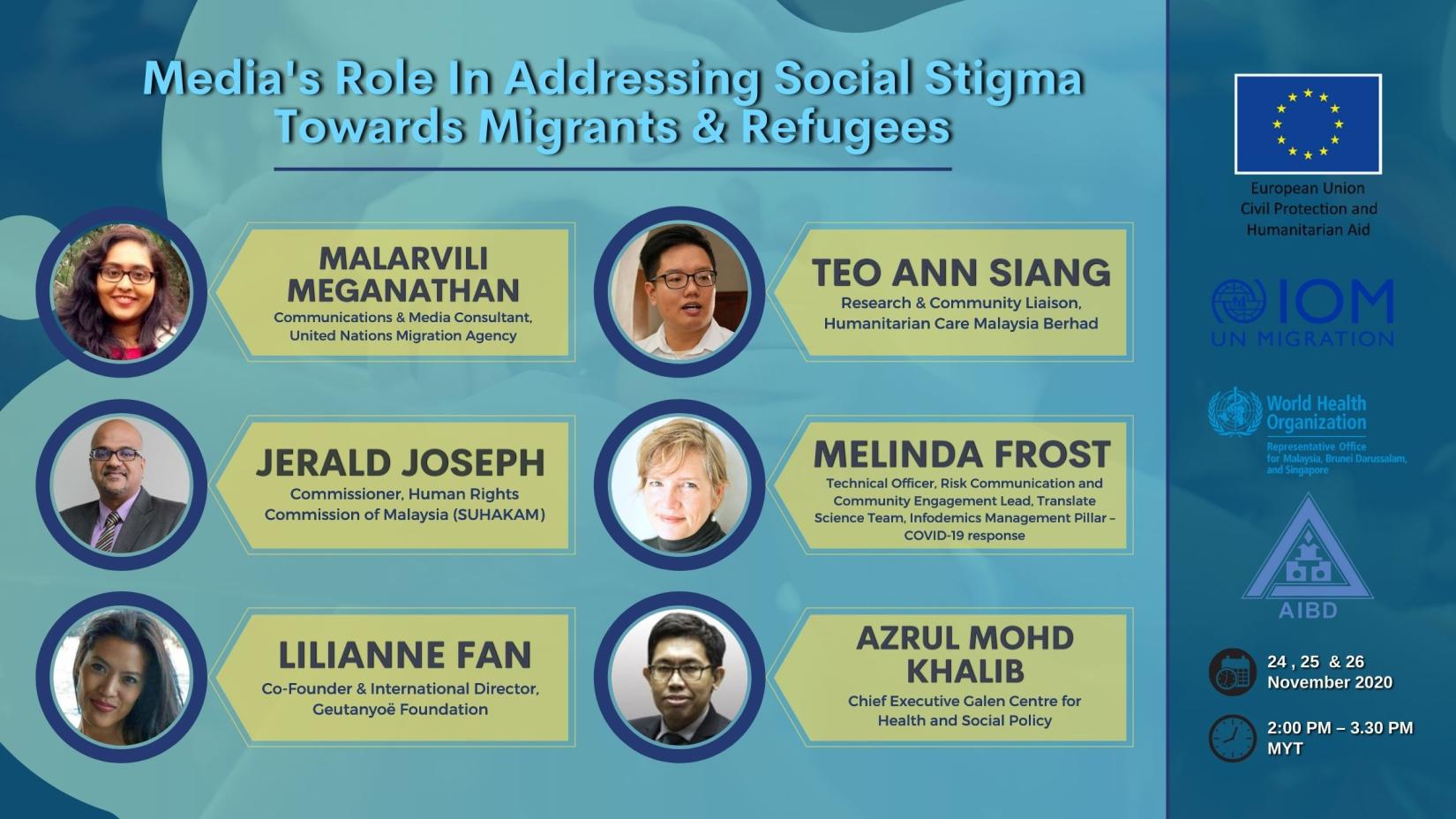Regional Media Training in Malaysia Addresses Stigma and Xenophobia Towards Migrants and Refugees

IOM, WHO and AIBD conduct media training to 40 media practitioners
The International Organization for Migration (IOM) conducted a three-day (24-26 November) regional media training on ‘Media’s Role in Addressing Social Stigma Towards Migrants and Refugees’ in partnership with the Asia-Pacific Institute for Broadcasting Development (AIBD) and the World Health Organization (WHO).
More than 40 media practitioners including journalists, producers, editors, risk communication professionals and social media managers from 14 countries participated in the virtual training funded by the European Union Civil Protection and Humanitarian Aid (ECHO).
The training featured multiple informative sessions including Shaping the Narrative: Media, Migration and Public Perception by Malarvili Meganathan, IOM Malaysia Media and Communications trainer, followed by Effective Risk Communication: A Public Health Perspective by Melinda Frost, WHO ‘Translate Science’ team lead and Media Matters: Representation and Humanitarian Assistance by Teo Ann Siang, author and humanitarian.

The training provided a broad overview of global migration and development, before zeroing in on the critical role of media in influencing public perception, the usage of accurate key terminologies in migration reporting and the importance of stigma-free language in COVID-19 related recovery efforts. Media practitioners were also briefed on the impacts of misinformation and how to effectively address rumours on social media and other digital platforms.
Although many communities around the world have responded to COVID-19 with strong cooperation and solidarity, some have, however, used it as a pretext to scapegoat migrants, refugees and the most vulnerable, blaming them for the spread of the virus.
The pandemic has seen an alarming increase in anti-migrant rhetoric, stigma, xenophobia, and discrimination. According to the Institute of Strategic and International Studies Malaysia, the intentional creation of false information has fuelled a public outrage targeted at the marginalised communities.’
“As we move towards building a sustainable, resilient recovery effort, there has never been a more urgent time to address these challenging issues. A collective, progressive and comprehensive answer to combating xenophobia can be put into action with the help of our participants,” said Kendra Rinas, Head of Office, IOM Malaysia.
She added that following the success of the first regional media training, a series of trainings will be held in the coming months to encourage responsible, meaningful conversation from a socio-economic and public health perspective.
The pandemic has also brought to the surface pre-existing inequalities, which put migrants and refugees at greater risk of xenophobia and discrimination, further impacting their mental and physical wellbeing and excluding them from accessing services that are otherwise available to the general population.
“Media professionals play a vital role in shaping public perceptions by providing facts and balanced information. It is important to avoid stereotypical, negative expressions that can create or increase stigma, and focus on inclusive language,” said Philomena Gnanapragasam, AIBD Director.
According to WHO, stigma-ridden language can drive people to hide their illness to avoid discrimination, preventing them from seeking immediate health care which is not only in their own best interests but also of the wider community.
In the longer term, stigmatisation and discrimination can negatively impact the ability of the vulnerable population to integrate into society. This not only undermines their wellbeing, but more broadly, that of receiving communities which benefit from their diverse contributions to social cohesion.
The training concluded with an engaging forum moderated by IOM on stigma, solidarity and social cohesion which featured experts from human rights and civil society organisations including Jerald Joseph, Commissioner, Human Rights Commission of Malaysia, Lilianne Fan, International Director of Guetanyoe Foundation and Azrul Mohd Khalib, Chief Executive Officer of Galen Centre for Health and Social Policy.
For more information, please contact Wong Chun Ting and Malarvili Meganathan at cwong@iom.int



